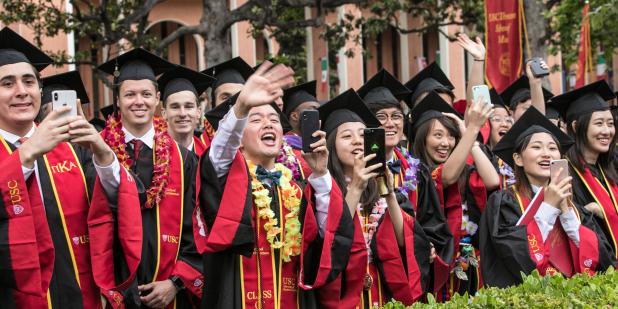Join us for a free one-day workshop for educators at the Japanese American National Museum, hosted by the USC U.S.-China Institute and the National Consortium for Teaching about Asia. This workshop will include a guided tour of the beloved exhibition Common Ground: The Heart of Community, slated to close permanently in January 2025. Following the tour, learn strategies for engaging students in the primary source artifacts, images, and documents found in JANM’s vast collection and discover classroom-ready resources to support teaching and learning about the Japanese American experience.
Chinese Students in U.S. Colleges

Subscribe to our weekly newsletter to get it delivered straight to your inbox!
It's graduation season. U.S. universities remain the top destination for international students, with over 800,00 active students pursuing post-secondary degrees in 2020. That was a 25% drop, in large part due to the pandemic. For more than a decade the greatest number of those students have come from China. The former number one source for international students, India, is more than 100,000 students behind China. A fifth of the Chinese students are studying in California, the most of any state. USC hosted the fourth most total international students and was the top school in California.
Students in the U.S. and China have different preferences for college majors. In the U.S., the top three choices are business, health, and social sciences, whereas in China, the top choices are software engineering, electronic engineering, and Chinese language and literature. A recent survey from the Chinese Ministry of Education, however, reports that nearly 70% of students choose majors without knowing much about them.
Studying abroad is a great route to developing a deeper understanding of others. Most Americans, however, don't study abroad and few study for academic credit in China. Over the last decade the number of Americans studying in China has dropped from 14,877 (2011-12) to 11,639 (2018-2019). Europe has long been the preferred destination for American students going abroad. In 2018-2019, 56% went to Europe. The bulk of American trade is with Asia, but just 12% of the Americans studying abroad went to Asia in 2018-2019.
Having many smart and able Chinese and others come to study in the U.S. has been a great asset for the U.S. A Paulson Institute study, for example, noted that 29% of those teaching courses on artificial intelligence in the U.S. earned their undergraduate degrees in China. The U.S. benefits from such a flow of talent. And those returning to China have had an opportunity to experience life in the U.S.
But many wonder if recent developments will cause some from China to look elsewhere to study. The rapid rise of hostility and even violence towards people of Asian ancestry has parents and students worried about day to day safety. And some people of Chinese ancestry worry that U.S. employers and the government may view them with suspicion simply because of their real or imagined ties to China. Prof. Xiaoxing Xi spoke about this at a recent USCI webinar.
Fewer Chinese undergraduates applied to U.S. universities for fall 2021. Of course, when students were applying last fall the U.S. was not even issuing visas. That changed in May and the U.S. is now issuing visas, though some applicants complain they have been denied visas due to their family backgrounds. U.S. officials stress that students are welcome, but must be transparent about their backgrounds and intended study. Americans overwhelmingly told Pew they favor welcoming students from abroad. But a majority also said they support limiting Chinese students in the U.S. Will U.S.-China rivalry harm the educational exchange that has clearly benefited both countries?
Featured Articles
Please join us for the Grad Mixer! Hosted by USC Annenberg Office of International Affairs, Enjoy food, drink and conversation with fellow students across USC Annenberg. Graduate students from any field are welcome to join, so it is a great opportunity to meet fellow students with IR/foreign policy-related research topics and interests.
RSVP link: https://forms.gle/1zer188RE9dCS6Ho6
Events
Hosted by USC Annenberg Office of International Affairs, enjoy food, drink and conversation with fellow international students.
Join us for an in-person conversation on Thursday, November 7th at 4pm with author David M. Lampton as he discusses his new book, Living U.S.-China Relations: From Cold War to Cold War. The book examines the history of U.S.-China relations across eight U.S. presidential administrations.





